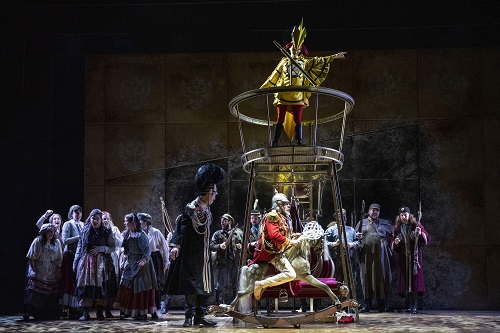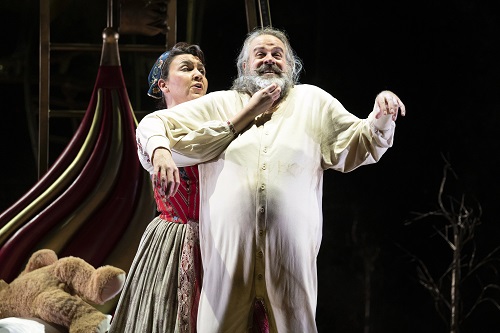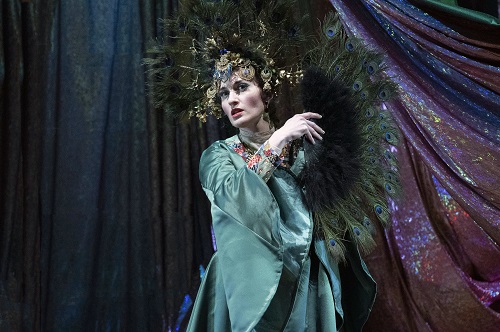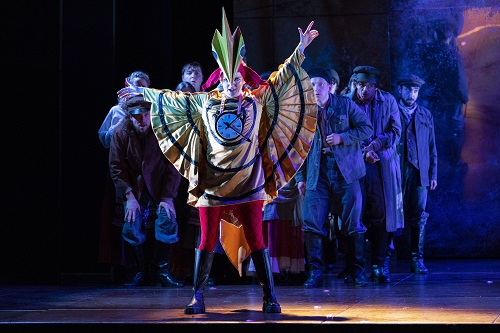Rimsky-Korsakov’s 1907 fantasy-fable, The Golden Cockerel, brings together folklore and fact, angling Pushkin’s 1834 surreal satire on a Russian autocracy led by Nicholas I towards the Tsarist regime of Nicholas II which had led Russia to a humiliating defeat in the Russo-Japanese war of 1904-05 and had been rattled by the 1905 storming of the Winter Palace. A tale about an incompetent ruler leading his decaying kingdom toward catastrophe naturally didn’t go down well with the censors and the opera was not heard until 1909, after the composer’s death.
Of course, ETO’s artistic director James Conway didn’t have a crystal ball when he planned the company’s 2022 spring tour, but the timing of ETO’s new production of Rimsky-Korsakov’s opera felt similarly unfortunate and discomforting at this first-night performance at Hackney Empire. A crackpot leader of a crumbling empire sends an incompetent army off to conquer neighbouring lands; soldiers quiver with fear as they obey the paranoid patriarch’s commands. Hardly the stuff of laughs as World War 3 looms.

Perhaps one could play up the macabre absurdity or the black bitterness of the satire? Conway opts for pantomime slapstick. The economy and effectiveness of Neil Irish’s designs impress, and the sets are brilliantly lit by Rory Beaton, but there’s an ‘amateur G&S’ levity and detachment here, without the accompanying facility of ensemble-direction. The stage feels cramped and crowded, though the ETO chorus are in fine vocal fettle. The image of soldiers fondling of a phallic canon as a King succumbs to sensuous song seems cheap and not very cheerful, and cartoon violence that leaves no one dead distasteful. The librettist Vladimir Belsky maintained Pushkin’s rhyming couplets, but the trite translation by James Gibson and Antal Dorati puts one’s teeth on edge.

Tsar Dodon’s reputation for ruthless warmongering seems as ill-fitting as his armour and as rusty as his sword. We find him loafing in his bed-throne and bumbling about, lamenting the fact that foreign powers are massing on his borders, while his two heirs, Guidon (Thomas Elwin) and Aphron (Jerome Knox) – sailor-suited schoolboys who bounce about like wobbling Weebles – eye up the crown. The arrival of the Astrologer, bearing a cockerel-cum-warning alarm-system (Alys Mererid Roberts) – no payment needed, an IOU suffices – calms everyone down … until the cock, perched on its look-out tower above the throne, duly crows its heraldic call, and the Tsar’s two sons are sent on a scouting mission. Further alarm-calls force Dodon to squeeze his stomach into his steel vest, mound his stead – a rocking-horse, naturally – and set off to see what’s what. He encounters the Queen of Shemakha, a foreign Tsarina whose seductive wiles conquer both King and kingdom. When he returns home with his new Queen the Astrologer turns up to cash in his IOU: he wants the Queen, but the King refuses and slays him. The skies darken, the Queen laughs hysterically and the cockerel, coming home to roost, has the last word – pecking the spurned King to death. Come dawn, Queen and Cockerel have vanished.
The three main roles present significant vocal challenges and they were met here with varying levels of success. Dodon needs a smooth, rich basso cantate: Grant Doyle is a baritone and though he makes a good effort to summon the required tonal weight, the direction turns Dodon into a buffo send-up who dances, and sings, to Shemakha’s tune: more Don Pasquale than paranoid despot.

The Queen of Shemakha is a role for a lyric coloratura soprano. American soprano Paula Sides has a heavier, darker voice, but she’s consistently precise and powerful. The King’s ‘shadow’, the Astrologer, is a stratospherically high tenor altino role. Robert Lewis reached the heights but not without effort; for a centuries-old soothsayer, he was also a rather youthful taleteller, informing us in the opera’s prologue that he would conjure us a tale from ages yore – a fairy tale with an excellent moral – and morphing improbably into Rasputin (to Shemakha’s Tsarina Alexandra Feodorovna) at the close.
Like Jacob Rees-Mogg, Dodon likes to keep his former nanny, Amelfa, close at hand, and when comforting the King as he told of his erotic dreams, Amy J. Payne displayed an impressive chest voice. It didn’t seem out of keeping that she later became a propagandist parrot of the regime.

Gerry Cornelius conducts with fluency, and Iain Farrington’s arrangement is characteristically inventive, drawing forth some of the pictorial details, but the sardonic bite of the score never really surfaces, and the coloristic and textural bloom of the orchestration is inevitably dampened.
Konstantin Youn’s A new planet, depicting the 1917 October Revolution, forms the drop-cloth, but the imagery can seem less glorification than catastrophe. At the end of the opera, but not Pushkin’s poem, the Astrologer presents an epilogue, consoling Dodon’s subjects that their lives will be better without a Tsar. Pushkin’s final lines explain that ‘Fairy tales, though far from true, /teach good lads a thing or two’. We’ll have to hope that the ‘truths’ represented by the cockerel – that Dodon’s foreign policy is doomed, that the people will prevail, and injustices be righted – are more than fairy-tale prophecies.
Claire Seymour
Tsar Dodon – Grant Doyle, Queen of Shemakha – Paula Sides, Astrologer – Robert Lewis, Prince Guidon – Thomas Elwin, Prince Afron – Jerome Knox, General Polkan – Edward Hawkins, Amelfa – Amy J. Payne; Golden Cockerel – Alys Mererid Roberts; Director – James Conway, Conductor – Gerry Cornelius, Set/Costume designer – Neil Irish, Lighting Designer – Rory Beaton, English Touring Opera Orchestra and Chorus.
Hackney Empire, London; Saturday 5th March 2022.